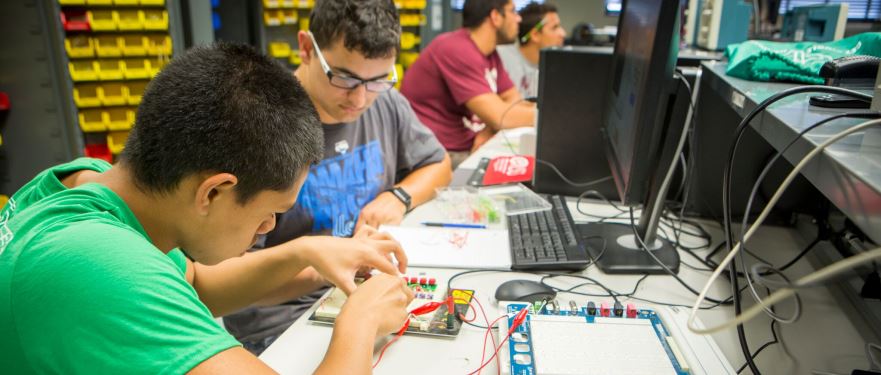Electrical Engineering

What is Electrical Engineering?
Electrical engineering (EE) is a discipline that studies and applies technologies arising from the presence and movement of electric charges that are fundamental to all matters. Typical areas of study of EE range from semiconductor components to complicated communications or control systems.
LMU's Electrical Engineering program provides a broad, high-quality curriculum covering fundamental topics in circuits, digital systems, electronics, communications, electromagnetism, and more to helps students understand electrical systems and their design and implementation. Our electives offer a deepened education on more advanced subjects including integrated circuits, wireless networking, and control systems. The senior designs at LMU EE are team-based and often feature projects in collaboration with the local industry. The yearlong process will enforce students’ integration of skills such as theoretical rigor, hands-on capabilities, oral/written communications, and teamwork that our program is designed to continuously cultivate.
What do Electrical Engineering majors do?
An Electrical Engineering major normally conduct work related to the design, development, manufacturing, and testing of electrical components, devices, and systems, either during an internship or in a full-time job after graduation. Some examples of these electrical systems include communication systems, consumer electronics, medical equipment, robots, radar, and navigation systems.
Our students earn internships from local industries such as Raytheon, Boeing, Belkin, CalTrans, and LADWP as well as prestigious government sponsored programs by NASA and the National Science Foundation. Some students also work side by side with faculty members of LMU on major research projects and produce high-quality published work. While many of our graduates enter the workforce immediately after earning their degree, others go on to graduate studies or professional schools in medicine, law and business. The large aerospace corporations and the fast developing Silicon Beach present LMU, especially our Electrical Engineering program, with unprecedented advantages to connect our students with real-world engineering opportunities here in Southern California.
Is this major right for you?
You might be an Electrical Engineering major if you:
- Are interested in working with electrical and electronic systems
- Like creative and laboratory work
- Enjoy math and physics
- Are both motivated and self-disciplined
About our faculty
Our faculty members are first-rate instructors and experts in their respective fields. Many faculty members are active researchers or industry consultants, and regularly publish their work in prestigious scholarly periodicals and present at international conferences. The whole faculty is behind our student-centered program, and it provides students with unparalleled care and personal attention as their education progresses.
Students can also benefit from our superb, newly upgraded facilities including multimedia classrooms, computer labs, and lab equipment.
About our students and graduates
Our students earn internships at prestigious institutions such as NASA and the National Science Foundation. Students work side by side with faculty members on major research projects and present the results of their research at regional, national, and international conferences.
While many graduates enter the workforce immediately after earning their degree, others go on to graduate studies or professional schools in medicine, law and business. Graduates have worked for a variety of companies — from large aerospace corporations to small electronics manufacturing firms, from public utilities to entertainment firms, and from software development and consulting firms to small tech startups.
Representative courses
Some of the courses offered by the EE undergraduate program at LMU are:
- Electric Circuits
- Logic Design
- Electronics
- Linear Systems
- Introduction to Microprocessors
- Electromagnetics
- Communications
- Digital VLSI Design